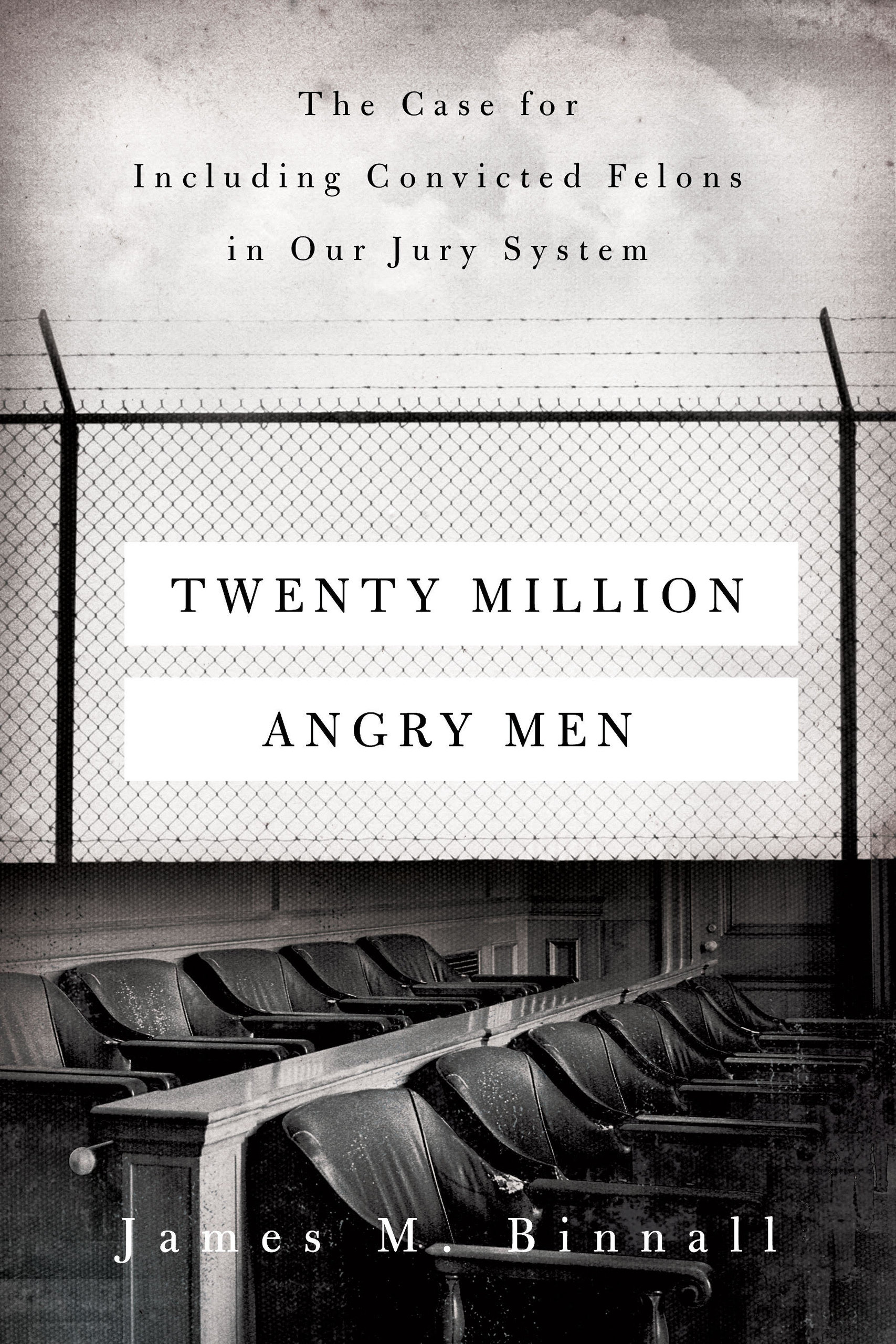For the carceral citizen, life after a criminal conviction can be perplexing. In some contexts, gatekeepers place a premium on our experiences and include us because of the singular knowledge we possess. In others, our intimate understanding of the carceral system is a liability and the reason gatekeepers deny us access. Knowledge of this sort, which I like to call experiential carceral knowledge, is then both an asset and a liability, leaving many of us to wonder about the inherent value of our histories. Here, I consider the disparate valuation of experiential carceral knowledge by looking at two related but distinct contexts that I’m deeply invested in — higher education and our jury system — and I suggest that as in the classroom, the knowledge those with a carceral history possess is necessary in the jury box, as it sheds light on a system that too often uses obfuscation to avoid critical analyses.
In recent years, education has become one of the central pillars of many reentry initiatives. Perhaps buoyed by research indicating that students with a carceral history possess skills and attributes that make them well-suited to excel in higher education, advocates have worked tirelessly to advance a number of important reforms that have included banning the criminal history box on college applications in a number of jurisdictions and revising Pell Grant eligibility guidelines to make financial assistance available for most applicants with prior convictions. In turn, colleges and universities have begun to expand their efforts to recruit and support formerly incarcerated and system-involved students.
One of the most prominent organizations involved with such efforts has been California’s Project Rebound. Founded in 1967 at San Francisco State University by formerly incarcerated sociologist Dr. John Irwin, Project Rebound is now a state-funded, statewide consortium with chapters at 14 campuses in the California State University system. “One of the hallmarks of Project Rebound’s philosophy … involves cultivating and amplifying the many assets that formerly incarcerated students bring to the university community and the wider society,” noted the project’s 2021 annual report. “These assets typically include resourcefulness, enthusiasm, gratitude, self-determination, and profound commitments to service, fairness, and social justice.”
In my role as executive director of Project Rebound at California State University, Long Beach, my job is to oversee the recruitment and support of formerly incarcerated students. As part of that task, I must cultivate relationships with administrators, faculty, staff, and prospective donors, who often describe our members as “courageous” and “resilient.” As a formerly incarcerated person, I subscribe to what is known as a strengths-based perspective and agree with these depictions of our students. Still, apart from their laudable personal characteristics forged by the trauma of a carceral experience, these students also possess a knowledge that those without a carceral history simply do not have.
What we saw, felt, and heard while part of the carceral system is invaluable knowledge — data — that certainly informs any discussion of criminal justice issues.
Experiential carceral knowledge is what we learned by being labeled, caged, and then supervised. What we saw, felt, and heard while part of the carceral system is invaluable knowledge — data — that certainly informs any discussion of criminal justice issues. We are insiders. As Michelle Fine and Maria Elena Torre have written, we “know more, know better and in more depth” how the carceral system operates. Consider this statement by a respondent who took part in a sociological study of students with a carceral history: “As a student, I was always talking about my background. By the second semester, students started asking me about the criminal justice system.” According to the respondent, there were meaningful opportunities to engage with other students about the workings of the system through talks with community-based organizations, and that some even regarded those interactions as “the most important day in their school career.”
Many colleges and universities are now openly acknowledging the value of what we know, so much so that we are now often courted and incentivized financially to enroll. In this way, institutions of higher education seemingly recognize that experiential carceral knowledge is a necessary component of a robust educational experience.
To be clear, colleges and universities do not categorically welcome the knowledge a student with a carceral history possesses. The vast majority of institutions of higher education still inquire about an applicant’s criminal history and then consider those answers in admissions analyses, justifying the use of such questions by citing a need to protect students and insulate the institution from liability. But the line is trending toward inclusion. Research demonstrates that institutions of higher education benefit from having students with a carceral history on campus and undermines the claim that carceral citizens jeopardize campus safety. Moreover, the formation of grassroots organizations dedicated to advancing the educational prospects of our population has led to public pressure to admit our applicants and, in turn, fostered more educational opportunities for those with prior carceral histories. A foundational step in this slow evolution has been the recognition — admittedly, often tacit — that our experiential knowledge has value.
In my other role, that of a researcher, I explore the statutory exclusion of carceral citizens from jury service. Twenty-seven states and the federal government permanently exclude citizens with a felony conviction from the jury process. Restrictions in the remaining jurisdictions vary in severity — excluding carceral citizens when their term of confinement is completed, when their criminal sentence has terminated (including any period of supervision), or in response to a combination of factors that may include the type of crime of conviction or the length of time since conviction. Maine is the only state that allows carceral citizens with a felony conviction to serve without restriction.
Courts and lawmakers justify these categorical exclusions by making two arguments. First, they say that a felony conviction reveals a flaw of character that would corrupt the function and integrity of the jury process — what is known as the probity rationale. Second, they argue that carceral citizens harbor biases that make them sympathetic to criminal defendants and adversarial toward prosecutorial agents — what is known as the inherent bias rationale. Much like campus safety and liability concerns in the context of higher education, these rationales for excluding carceral citizens from jury service are purportedly prophylactic, designed to protect the jury from the threatening “other.”
But while the protection of the jury should concern us all, no evidence suggests that the inclusion of carceral citizens would corrupt the adjudicative process. Instead, evidence tends to show that those with a carceral history approach and engage in jury service thoughtfully, conscientiously, and impartially. Describing his experiences as a former juror, one carceral citizen in Maine explained:
I just said . . . “you gotta go from what you really see.” ‘Cause, there was like two ladies that had never been on a jury, and they were like, “We’re not gonna make no decisions.” And, I said, “You have to go with what you see. The evidence. Everything that you get, that we’ve already been through, you have to weigh that out. You can’t just say yes or no. . . .” I even got up and put all this stuff on the chalkboard that, the pros and cons.”
Far more important than the fictional threat posed by jurors with a carceral history are their potential contributions to jury deliberations. In the first mock jury experiment to include carceral citizens with a felony conviction, the results strongly suggest that such citizens enhance rather than detract from the deliberation process, as they raised more novel case facts and contributed a greater proportion of their jury’s deliberation duration than did their non-felon counterparts. An additional analysis of deliberation transcripts from that experiment bolster prior findings. Jurors with a felony conviction drew on their pasts when evaluating the veracity of evidence and applying the law to the facts. One juror with a felony conviction, for example, called on his own experiential knowledge to clarify the defendant’s apparent admission of guilt to a witness — “I guess I am going back to prison” — after he missed his appointment with his parole officer in our mock jury stimulus. That exercise asked jurors to decide whether the defendant, a parolee, committed a bank robbery on the same day he missed that appointment:
The reason why he said that was because he missed his one o’clock appointment … plus he was in contact with police because they brought him in for a lineup. When you’re in contact with police and you’re still on parole or probation, you’re done… [s]o that’s why he said, “I guess I’m going back to prison.”
Similarly, another juror with a prior felony conviction questioned the defendant’s choice to simply skip his appointment without notice:
In that situation, the number one thing is to contact my [parole officer] and say ‘Look, I’ve got a situation here. I’m not going to make it in 20 minutes to where this one o’clock appointment is, and I got verification that the tow truck person is — I got a receipt coming from the AAA auto club to verify that it was broke down at 12:40.’ Why didn’t he do that? Doesn’t make sense…”
In both instances, jurors used their histories and the lessons learned from those experiences to assist a non-felon juror by accurately appraising a factual scenario they have themselves encountered. Like the formerly incarcerated student who suggested that he was an important source of knowledge for his classmates, so too were the jurors with a carceral history for their fellow jurors. In this way, inclusion yielded higher quality deliberations at no cost to the integrity of the process, ostensibly increasing the value of experiential carceral knowledge in this context. Still, the waning use of jury trials and statutory restrictions on carceral citizens make exchanges like these a rarity — much to the detriment of the jury, parties to the case, and justice generally.
Reforms that are increasingly making institutions of higher education more accessible for those of us with a carceral history were spawned, in significant part, by research and activists who understood the value of experiential carceral knowledge. And while the jury has been far more resistant to including carceral citizens, recent legislation in California bodes well for the future of an all-inclusive jury system. In January 2020, California amended its juror eligibility criteria — with limited carveouts — to include those with a felony criminal history. With this change, California became the first jurisdiction in almost two decades to expand its juror pool to include carceral citizens.
While lauding a carceral past as an educational asset, we banish from the jury box those with intimate knowledge of the carceral process, discarding their deep understanding of the structural, racialized practices that plague our criminal justice system.
While the primary function of the jury is as a neutral arbiter of facts, jury service is also an educative exercise. In his study of American juries, Tocqueville wrote that jury service is an exercise in which “each juror learns his rights … [and] is given practical lessons in the law, lessons which the advocate’s efforts, the judge’s advice, and also the very passions of the litigants bring within his mental grasp.” Research supports Tocqueville’s sentiments, as studies have demonstrated that serving spawns higher rates of civic participation, and that jurors learn from one another; by cooperatively working to achieve an often difficult task, jurors have sustained, meaningful contact resulting in a familiarity that can break down preconceived prejudices and stereotypes about one another. In this way, the jury is, as Tocqueville described it, “a free school which is always open.”
Still, while lauding a carceral past as an educational asset, we seemingly place little value on this type of experiential knowledge in the jury context. We banish from the jury box those with intimate knowledge of the carceral process, discarding their deep understanding of the structural, racialized practices that plague our criminal justice system. Yet on campus, we welcome such knowledge and leverage it as a tool with which to teach others. In this respect, perhaps the evolution of inclusive higher education is instructive — for those who care about juries specifically and experiential diversity in general.

In my new book — Twenty Million Angry Men: The Case for Including Convicted Felons in Our Jury System — I compile and detail the burgeoning body of research on the exclusion of carceral citizens from jury service. Overwhelmingly, that research favors the elimination of statutes that strip carceral citizens of their juror eligibility. State policies are moving, albeit slowly, in that direction. In 2019, the same year that California’s juror eligibility criteria were on the ballot, Louisiana and New York attempted to ease juror eligibility restrictions on citizens with a carceral history. And while both measures failed, their legislative analyses — like those conducted in California — relied heavily on empirical evidence and drew support from activists dedicated to removing obstacles to civic engagement for our population.
As a formerly incarcerated person and a jury researcher, I have hope that these developments will soon lead to the inclusion of carceral citizens in our jury pools nationwide, calling on them for their experiential knowledge of our criminal justice system. To get there, we will need to continue to challenge baseless, fear-driven claims of risk and threat with rigorous research and stout data. We will also need to enlist our allies — those who understand our experiences. By looking at the evolution of inclusive education and prioritizing the value of our histories, we may be able to move the needle toward a more culturally competent jury system.
And yet that will unfortunately not be enough; a change in legislation is only the first step. What must follow are robust notification provisions that inform carceral citizens of their newfound juror eligibility and encourage them to take part. We must also be vigilant on the ground, ensuring that legislative changes in this arena are effectual, critically examining the use of for-cause and peremptory challenges aimed at carceral citizens, while also working to ease additional structural barriers to participation salient for our population like employment insecurity, loss of pay, childcare needs, and transportation obstacles.
In the end, experiential knowledge derived from a carceral experience has value in all contexts — the jury included. Without it, efforts to change our carceral trajectory are incomplete. As one of my students is fond of saying: “You scooped us up and locked us in. Now listen to what we have to say — you may learn something.”
Image: Unsplash

